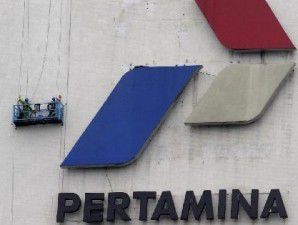JAKARTA. Energy and Mineral Resources Minister Jero Wacik has urged the 270 oil and gas contractors operating in the country to fulfill their investment commitments otherwise the government will terminate their contracts.
“Each year, every contractor will have to submit a work plan and budget [WP and B] to [upstream oil and gas regulator] BPMigas. I expect BPMigas to supervise very closely whether they fulfill their commitments or not. If they fail to perform, we’ll terminate the contracts,” he said on Monday.
He said that he understood the companies’ need to make the highest possible profits. However he reminded them that the government’s interests had to be prioritized. “I also hope that those companies pay attention to residents living near their operation areas.”
The messages were delivered after the ministry announced winners of the second phase of the 2010 oil and gas blocks auction process and the first phase of the 2011 auction.
Indonesia’s oil output has declined steadily over the past seven years due to a lack of investment in new projects and to production expansion in existing oil fields. Output currently stands at 905,000 barrels per day (bpd), down from 980,000 bpd in 2004.
Uncertainty in regulations and bureaucracy have partly been blamed for deterring major oil companies from increasing their investments.
Sammy Hamzah of the Indonesian Petroleum Association (IPA) claimed that his organization would fully support the minister’s intentions to strengthen supervision of contractors’ compliance with
investment commitments.
“It’s in the contracts we sign with the government that if we fail to fulfill our commitments, the contracts may be terminated,” he said.
However, he emphasized that the minister should also offer more help to contractors who wanted to execute investments but found difficulties in doing so. “There are various problems that hinder contractors in executing their plans on schedule, like delays in permission issuance. Jero has to offer solutions to those problems.”
In a bid to increase output, the government announced the winners of eleven auctioned blocks.
They include Arguni I which was won by Eni Arguni I Limited; East Jabung by Pan Orient Energy East Jabung; Ranau by Prabu Energy; Northeast Madura by Techwin Energy Northeast Madura; West Tanjung by PT MRI Energy; Belayan by PT Geraldo Energy; East Simenggaris by Sonlaw United Corporation; North Ganal by the consortium of Niko Resources (North Ganal), North Ganal Energy, Statoil Indonesia North Ganal AS, Eni North Ganal Limited and GDF Suez New Project Indonesia B.V.
The remaining three blocks were Babar Selaru which was won by Inpex Banda Sea Limited; Obi by the consortium of Niko Resources (OBI) Limited, Statoil Indonesia Obi AS and Zimorex N.V. and Semai IV by Murphy Semai IV.
The total investment in the exploration phase is US$201.3 million plus the signing bonus for the government of $36.08 million.
The 11 blocks were directly offered to the investors, while for the regular tenders, only four out of nine blocks were taken by investors.
The four blocks are Offshore Timor Sea I which will be explored by Hess Limited; Halmahera II by the consortium of Niko Resources Limited and Statoil ASA; West Aru I by BP Exploration Indonesia Limited and West Aru II also by BP Exploration.
The four winners have committed to invest some $64.5 million with a signing bonus of $19.35 million.
Jero also witnessed the signing of the heads of agreement for the unitization of the Suban field at the Corridor block in South Sumatra between Pertamina and Conoco Phillips and Talisman (Corridor) and Pertamina Hulu Energi Corridor.
Jero said the Suban field, which has been operated by Conoco Phillips since 2002, directly bordered with the Suban working area, which was operated by Pertamina EP. With the deal, the field and the area would be developed as one working area by Conoco Phillips, while Pertamina EP would receive 10 percent of its gas production.
“The field will contribute around 13,000 barrels of oil equivalent per day [boepd] of gas. From that gas, Pertamina and the government may receive $2.6 billion in additional revenues until 2023.” (Rangga D. Fadillah/ The Jakarta Post)
Invest or lose oil contracts: Minister
November 22, 2011, 09.24 AM
/2011/11/22/576830494.jpg)
ILUSTRASI. Perdana Menteri Singapura Lee Hsien Loong masuk daftar awal penerima vaksin corona di Singapura
Reporter: Edy Can
| Editor: Edy Can
Latest News
-
March 05, 2026, 02.11 PM
Indonesia Gives Meta 'Stern Warning' Over Disinformation
-
March 04, 2026, 05.43 PM
Indonesia's Pertamina Unit Monitors Safety of Its Vessels in Middle East
-
March 04, 2026, 05.27 PM
Fitch Cuts Indonesia Credit Rating Outlook to Negative
-
March 03, 2026, 12.18 PM
Indonesia Hopes to Get MSCI Response to Capital Market Reforms Before May
-
March 02, 2026, 04.45 PM
Indonesia has Seized 5 Million Hectares of Palm Oil Plantations, Task Force Says
-
March 02, 2026, 01.10 PM
Asian Assets Slide as Mideast Strikes Spark Oil Spike, Haven Rush
-
March 02, 2026, 10.49 AM
Bank Indonesia Monitoring Market Movements in Response to Conflict in Middle East
-
February 25, 2026, 08.28 PM
Inpex to Solicit Bids for Construction of Indonesia's Abadi LNG Project in Mid-2026
-
February 24, 2026, 03.38 PM
Eni to Reach Final Investment Decision for Indonesia Gas Projects Next Month












